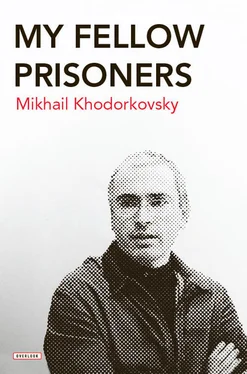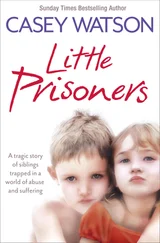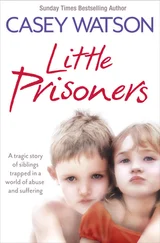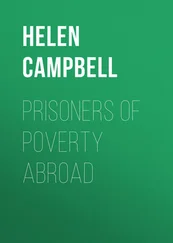It so happened that prison brought me into contact with a thirty-year-old guy on trial for suspected drug dealing.
Sergei is a long-term drug addict, though you wouldn’t know it from his appearance. He looks a bit younger than his years, very spry, educated. His mother is a Gypsy, his father Russian, which created an interesting situation, culturally speaking. His mother had to leave the Gypsy community, and she now works as a radiologist in a hospital.
Sergei speaks Roma, he knows Gypsy traditions and socializes with other members of the community, but doesn’t feel part of it. He’s been a drug-user for a long time (like most of the young people in his small town), but because he comes from a family of medical professionals and is strong-willed he is meticulous about the purity of the ‘wares’; he also makes sure he eats properly and regularly detoxes – abstaining for several weeks to prevent a constant build-up of his tolerance levels.
In fact, he asked to be put in my cell so that he could go through one of his detox sessions, since the rest of the prison, he says, is not ‘conducive to this’. For a few days he has a rough time, but then it eases up and he tells me his story, little different from dozens of others I’ve heard. As a user he would buy from one particular dealer; the police insisted that he grass on his supplier, he refused, so they fitted him up as a supposed dealer himself. Now he’s back and forth to court where they’ll likely give him between eight and twelve years even though he’s never dealt. They planted some ‘traced’ money on him; where the drugs came from isn’t clear.
I’ve heard so many of these stories. I nod politely, and that’s the end of the conversation.
A few days later Sergei suddenly comes back from court in a state of shock. It turns out that they produced as a witness the person who had set him up. This guy’s about fifty years old. He too was arrested, on some unrelated charge, and was given a medical in the prison hospital, where it was discovered that he had an incurable illness. This man gets into the witness box, recounts his situation, and declares that ‘with my sentence, I’ll die in jail. I’ll be dead soon. I’ve a lot of sins on my conscience and I don’t want to take on another one. So I’m going to tell the truth, and I’m not afraid even if they kill me.’
And then for forty minutes he tells everything about the set-up, how he was dealing drugs on the orders of the police, how he gave them the money, how they got rid of competitors and their clients, and so on. People crowd into the courtroom from the corridor, everyone listening to this chilling confession in deadly silence. Then the witness points at the investigators sitting opposite and says, ‘That’s them over there.’ The investigators get up and try to leave, but the court usher doesn’t let them, saying ‘The judge may want to take you into custody.’ The judge then stops the proceedings and clears the courtroom.
A few minutes later Sergei’s lawyer enters his cell and says that the judge is calling them back in. ‘What do you want me to ask for?’ the lawyer says.
‘My freedom, what else?’
‘That’s not going to happen,’ the lawyer replies and goes out.
An hour later he comes back in. ‘They’re offering you six years.’
‘Not good enough.’
The lawyer leaves again, but returns almost immediately. ‘Three years. You’ve already done more than a year, you’ll be out on parole.’
‘Done.’
‘What next?’ I ask Sergei.
‘Three years, I’m being sentenced tomorrow. Maybe I should have held out to the end?’
‘No, Sergei, you did the right thing. The system doesn’t work any other way.’
With ‘tomorrow’ comes his ‘three-year’ sentence, and the application for parole. He assures me that he will go back to his job as a railway worker and quit the drugs. I wish him luck.
So that’s the system. That’s the kind of people they are. They go to the very limit, to the edge. Which one day awaits us all.
It so happened that I met a young man, Nikolai (Kolya), as he was about to be released. There was nothing particularly remarkable about Nikolai. He was doing time for a fairly straightforward crime, drug possession – like roughly half the rest of the country’s prison population.
It was clear that he would be back. He’d already spent five of his twenty-three years behind barbed wire and showed little intention of changing his ways in the future. Although clearly not stupid, Kolya had grown up feeling rejected and unwanted. His life had been a constant battle with this feeling of rejection while being surrounded by similar outcasts.
Six months later I met Kolya again, now with a grisly scar on his stomach.
‘Kolya, what happened?’
‘Ah well, they got me with some gear again.’
For a moment Kolya hesitated, but then told me the full story, which is later corroborated by others who had witnessed it. Having taken in a repeat offender, the police investigators decided to charge him with an extra crime, for good measure. This kind of bargaining goes on all the time and is usually fairly open: you’ll only get an additional couple of years, they say, if we ask the judge, but you’ll have to carry the can for some robbery – and you’ll get extra visiting rights or choose where you end up. Generally it’s nothing more than a mobile phone robbery or some such. Kolya, after not much thought, agreed. But then for the identity parade they brought in an old woman whose purse, containing about 2,000 roubles, had been snatched by some scum. The pensioner clearly remembered little about it and quickly ‘identified’ the person indicated by the investigators.
At which point Kolya suddenly dug in his heels. ‘I’ve never touched an elderly person in my life, only people my own age. Robbing an old woman of her last rouble – no, I didn’t sign up for that, and I won’t do it. Whatever you do to me!’ The investigators were dumbfounded. ‘Kolya, as far as the law’s concerned there’s no difference. The money is the same, so’s the sentence. Why are you getting so steamed up? We can’t go and turn all of this around just because you’re feeling sensitive about it.’
‘I won’t do it,’ said Kolya.
So they sent him back to his cell, ‘to think it over’ – having first given him a bit of a beating, ‘as is only right and proper’.
After a while he knocked on the cell door from inside; when they opened the food hatch – his guts came flying out. Kolya had ‘opened himself up’, and some. Full-on hara-kiri. The scar is as wide as a finger and stretches halfway across his belly.
While the doctors were rushing across, others in the cell tried to stuff his entrails back in again.
It was a miracle they saved him. Now he’s disabled, but he has no regrets. ‘If they’d gone and pinned that old woman’s purse on me, I’d have died anyway,’ says Kolya – meaning the loss of his self-respect, without which his life is unimaginable.
I look at this man who has been sent down so often and think with a certain bitterness of the number of people on the outside who hold their honour far less dearly than he, who wouldn’t see anything particularly bad about robbing an old man or woman of a couple of thousand roubles. Although their crime would be clothed in clever words. They have no shame.
And, like it or not, I feel proud of Kolya.
These days there are very strong feelings against paedophiles among the public, which is not surprising. It’s an appalling crime, the result of a depraved and twisted mind that believes itself to be above the law.
Politicians, as is their wont, will use any situation to try to boost their ratings. But the ‘quota system’ (whereby people are arrested to meet a predetermined level of arrests), given the lack of genuine judicial protection, has resulted in abuses that are no less appalling and have tragic outcomes.
Читать дальше












